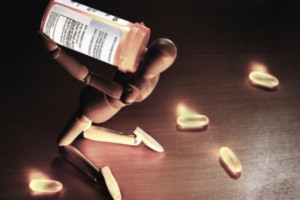
Who Combines Benzodiazepine with Opiates?
Most people use either opiates or benzodiazepine drugs as prescribed by a doctor. Physicians generally avoid prescribing both medications for one patient, as members of the medical community are aware of the risks posed by using both drugs simultaneously. Many people who take both benzodiazepine and opiates together do so for recreational uses, and not for therapeutic purposes.
Benzodiazepine abuse is especially common among opiate-dependent individuals using methadone as part of a drug maintenance program. In one survey of patients in a methadone program, 47 percent of respondents had a history of benzodiazepine abuse and 38 percent had used that prescription drug without a prescription. More than half of respondents (54 percent) started using benzodiazepines after enrolling in the methadone program and 61 percent of those who had used benzodiazepines before methadone treatment resumed benzodiazepine use or even increased use.
Benzodiazepine and Opiate Uses and Abuses
Doctors commonly prescribe benzodiazepine to help a patient manage anxiety or insomnia. Physicians also administer benzodiazepine as a sedative before a medical or surgical procedure, for the treatment of seizures, or acute agitation. Sometimes clinicians prescribe benzodiazepine to help patients through withdrawal from alcohol or opiates. Known side effects of benzodiazepine include drowsiness, fatigue and the loss of control over bodily movements.
For over 26 years, people from all over the world have chosen Waismann Method as their opioid detox provider.
We know the challenges you face and the importance of creating a unique and personal experience for you right from the start.Call for Detox Options 1-800-423-2482
Opiates, sometimes called opioids, are potent pain relievers. Similar to benzodiazepine, opiates can cause sedation, decreased mental alertness and depression. Opiates also create a pleasant sense of euphoria that makes this class of drug attractive to recreational users.
Benzodiazepine, by itself, only produces a limited amount of euphoria but it does potentiate, or strengthen, the euphoric effects of opiates – some call the effect “heroin-like.” Today, a growing number of recreational drug users are taking advantage of this potentiating effect by mixing opiates with benzodiazepines.
Combining Benzodiazepines and Opiates Can Cause Death
Combining benzodiazepines and opiates can be very dangerous and even life threatening. Both medications are nervous system depressants, which mean they each act directly on the parts of the brain responsible for essential functions, including breathing. Together benzodiazepines and opiates can suppress the respiratory center of the brain to slow breathing to the point of stopping. Ultimately, death is possible.
People who die of drug overdoses frequently had a combination of opiates and benzodiazepine in their bodies, according to the Centers for Disease Control and Prevention. In fact, opiates were involved in 71.3 percent of all overdose deaths in 2013 and benzodiazepine was involved in 30.6 percent, with some deaths resulting from more than one type of drug.
Individuals who combines benzodiazepines with opiates are at risk for great bodily harm and even death.Using the drug strictly as prescribed or looking for an appropriate drug treatment when addiction is present, is the only way to reduce this risk. If you or someone you know is addicted to benzodiazepines and opiates, reach for help. Discuss with the prescribing physicians your concerns and options. We are here for you and our trained and caring professionals are available to explain how the Waismann Method has helped so many to overcome the addiction to this dangerous drug combination.
Source
www.ncbi.nlm.nih.gov/pubmed/21595945
www.cdc.gov/homeandrecreationalsafety/overdose/facts.html





